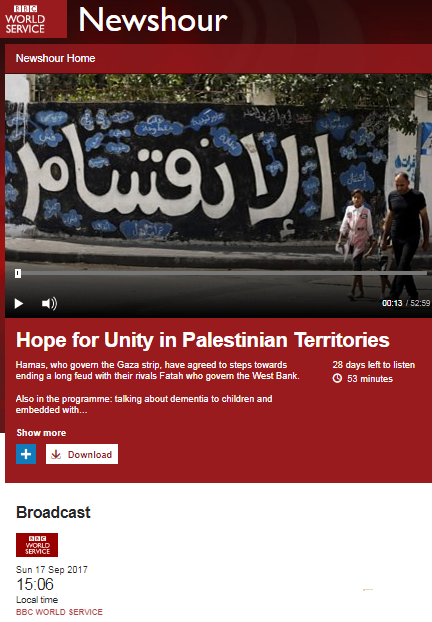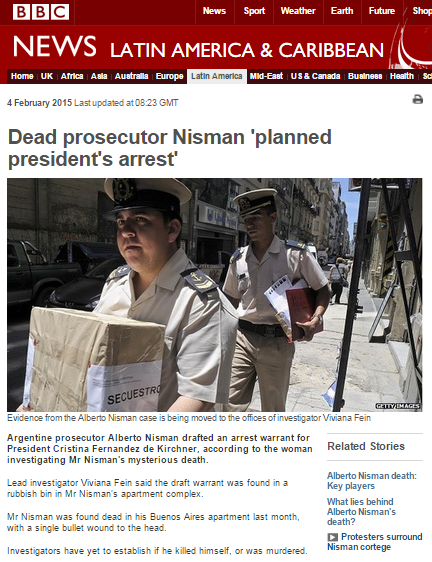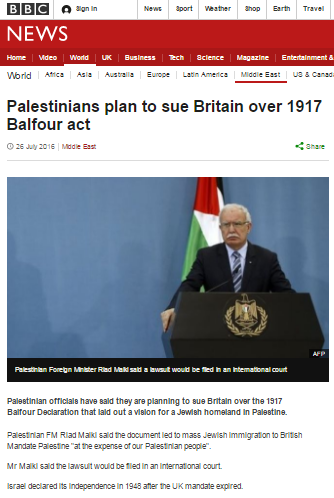On September 17th the afternoon edition of the BBC World Service radio programme ‘Newshour‘ devoted over a third of its one hour of airtime to its lead story – billed “Hope for Unity in Palestinian Territories”.
“Hamas, who govern the Gaza strip, have agreed to steps towards ending a long feud with their rivals Fatah who govern the West Bank.”
Presenter James Coomarasamy introduced the item (from 00:11 here) with an odd portrayal of the 2006 Palestinian Legislative Council election as relating to the Gaza Strip only.
[emphasis in italics in the original, emphasis in bold added]
“And we’re going to start with a long-awaited and potentially significant political gesture in the Middle East. It’s not directly related to the conflict between Israel and the Palestinians but to the internal Palestinian struggle which has a bearing on the hopes for peace. It’s a gesture that comes from Hamas; the Palestinian faction that won control of the Gaza Strip from its rival Fatah in an election in 2006 and took full control of Gaza by force a year later. Well Hamas is still considered a banned terrorist organisation in many parts of the world and its presided over a decade of increasing desperation for its citizens. Gaza is subject to a blockade by Israel and Egypt and in recent months its citizens have faced an extra squeeze with the reduction of their electricity supply. But now, in talks presided over by Egypt, Hamas has agreed to dissolve the administration in Gaza with a view to holding a future election. We’ll discuss what lies behind that decision and what it might lead to in just a moment but first, a reminder of what daily life is like in Gaza. Najla is a mother of two young children. She was born in Gaza and has lived there all her life and she spoke to Newshour last month.”
Listeners then heard an edited version of the long monologue from the inadequately introduced Oxfam employee Najla Shawa that BBC World Service listeners had already heard on September 3rd. Repeating her claim that the Gaza Strip is “a big prison”, Shawa added to Coomarasamy’s misleading and inaccurate implied linkage between the electricity crisis in the Gaza Strip and Israeli counter-terrorism measures in the form of border controls.
Next Coomarasamy introduced Yolande Knell who presented a factual picture of the Hamas announcement previously described by him as a “gesture” – although listeners may have been surprised to hear Knell describe “the administrative committee it [Hamas] set up in March” as “really controversial” given that the BBC has not previously reported on that topic.
Following an account of Egypt’s role in the appearance of Hamas’ announcement, Knell gave an accurate portrayal of some of the methods used by Mahmoud Abbas to pressure Hamas.
“Well some people are quite surprised that they [Hamas] have made these concessions, as they’re seen, particularly for example getting rid of this administrative committee. Previously it had said that it wouldn’t take these kinds of steps until the Palestinian Authority lifted some of the measures that it’s imposed upon Gaza in recent months because we’ve really seen this political divide between Hamas and Fatah deepening recently with President Abbas trying to pile on the political pressure and now you have only four hours on, sixteen hours off when it comes to mains electricity in Gaza. There’s been a longtime energy shortage but it’s got much worse because the PA put up a fuel tax for the sole power plant in Gaza. Then it instructed Israel to reduce mains electricity that it provides to Gaza. This is having effects on hospitals, on waste water management, with sewage being pumped into the sea and it’s also having a big economic effect. It also slashed the salaries for civil servants – PA civil servants – who were still receiving their salaries in Gaza.”
Although Knell has produced one reasonable report on the topic of the Gaza electricity crisis in the past, for the most part content on that topic produced by her and other BBC journalists has encouraged audiences to mistakenly believe that there is a connection between that crisis and Israel.
Coomarasamy then introduced “a view from Fatah” given by Abbas’ advisor Nabil Shaath. However, when Shaath stated that “many of us have some hesitation about the degree to which Hamas will be willing to go to the details”, he failed to question him further, passing up the opportunity to enhance listener understanding of the potential pitfalls that have dogged previous ‘unity’ agreements.
Shaath’s propagandist portrayal of Israel’s government as “colonialist” did not prompt comment or challenge from Coomarasamy.
Shaath: “I do not see how we can face Netanyahu and his extreme right-wing settler colonialist government and we cannot really make use of any potential changes in the world if we are not united.”
BBC audiences used to hearing from journalists and Palestinian commentators alike that Israel is responsible for the humanitarian conditions in the Gaza Strip may well have been surprised by Shaath’s admission of Hamas responsibility for the situation of the people of Gaza.
Shaath: “…Hamas has done much worse. Hamas destroyed their opportunities. Hamas subjected them to risks that they couldn’t take. Hamas led them into a life of isolation…”
Following his conversation with Shaath, Coomarasamy returned to Yolande Knell and – in contrast to the BBC’s written report on the topic – listeners were told of some of the factors that will affect any ‘unity deal’.
Knell: “The devil now I think is in the detail with what happens. We’ve seen this when previous arrangements have broken down. Who are going to be the key players in a national unity government? What’s going to happen about managing the border crossings? Will PA security forces be allowed to function in Gaza once again? What will happen then to the Hamas security forces – which is what you see on the street at the moment doing everything from…eh….controlling traffic.”
Listeners also heard a very rare acknowledgement of the reason for the collapse of negotiations between Israel and the Palestinians in 2014: an outcome portrayed at the time by the BBC’s Middle East editor as being entirely attributable to Israel.
“Israel of course views Hamas as a terrorist group, as does the US, the EU and others. And we’ve had some Israeli commentators pointing out how this actually makes things very difficult for Mr Abbas because when there was a national unity government agreed more than three years ago, this was a trigger for the failure of the last round of peace talks.”
Knell did however come up with some bizarre spin on the fact that the PA president – whose elected term expired in January 2009 – has no control over – or presence in – part of the territory he supposedly heads.
Knell: “…Israel always accuses Mr Abbas of not representing all the Palestinian people; of being weak in a way.”
Although listeners did hear some important information in this item that has long been absent from BBC coverage, one aspect of the story ignored throughout the discussions on the topic of the reasons behind Hamas’ announcement is that of the public unrest that apparently prompted Hamas to make a large purchase of fuel earlier this month. As the Times of Israel’s analyst noted:
“[Hamas leader] Haniyeh understands that, with little hope on the horizon, the severe economic crisis in Gaza can end in one of two ways: war with Israel, which could decimate the movement’s leadership and turn the population against it, or a “Gaza Spring” that would have similar results.
The best he can do under the circumstances is compromise, even if others say he caved in.”
The second item in this programme relating to the same topic will be discussed in part two of this post.
Related Articles:
Superficial BBC reporting on Hamas-Fatah ‘unity’ returns




